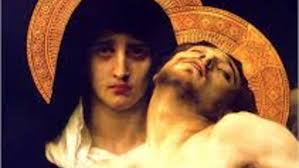A blessed memorial of Our Lady of Sorrows to all. This feast was first celebrated in the year 1233 – in the youth of that greatest of centuries, when Thomas Aquinas was but a young lad of eight, given as an Oblate to the Benedictines of Montecassino. It was the newly-founded Servite Order in Florence, officially the Ordo Servorum Beatae Mariae Virginis, the Order of the Servants of the Blessed Virgin Mary, who were the driving force behind this devotion to the sorrows of our Blessed Mother. Seven young successful men left everything they had in the world, banded together in community to follow a life of prayer, charity and devotion to the Virgin Mary. The Servites, as they are commonly known, now comprise friars (priests and brothers), sisters, contemplative nuns, and lay associates, found throughout the world. Their own particular Servite rosary is like the ‘regular’ (that is, Dominican) Rosary, but is said by praying one Our Father and seven Hail Mary’s on each of the Seven Sorrows, or ‘Dolors’, of Our Lady:
The Prophecy of Simeon (Luke 2:34–35)
The escape and Flight into Egypt (Matthew, 2:13)
The Loss of the Child Jesus in the Temple of Jerusalem (Luke 2:43–45)
The Meeting of Mary and Jesus on the Via Dolorosa.
The Crucifixion of Jesus on Mount Calvary (John 19:25)
The Piercing of the Side of Jesus, and His Descent from the Cross (Matthew 27:57–59)
The Burial of Jesus by Joseph of Arimathea (John 19:40–42)
As Saint Bernard of Clairvaux says in today’s Office:
Truly, O blessed Mother, a sword has pierced your heart. For only by passing through your heart could the sword enter the flesh of your Son. Indeed, after your Jesus – who belongs to everyone, but is especially yours – gave up his life, the cruel spear, which was not withheld from his lifeless body, tore open his side. Clearly it did not touch his soul and could not harm him, but it did pierce your heart. For surely his soul was no longer there, but yours could not be torn away. Thus the violence of sorrow has cut through your heart, and we rightly call you more than martyr, since the effect of compassion in you has gone beyond the endurance of physical suffering.
And our sorrowful world could use the intercession of Our Lady at the present moment, in the midst of our collective civilizational self-loathing and destruction. We must summon the courage to confront the ‘sorrows’ of this world, the parrhesia of the Apostles, speak the truth boldly, in ways that are concrete and may affect our own ‘person’.
To offer some hope and inspiration in the endeavour, I recommend a listen to Vivaldi’s and Pergolesi’s Stabat Mater – each sublime in its own way, and you may choose your preference. But first, the original Gregorian melody of the poem composed by the Franciscan friar, Jacopone da Todi (1230 – 1306), or perhaps Pope Innocent III (1161 – 1216).
Now, to Pergolesi’s rendition (1710 – 1736), who died too young of tuberculosis, but composed much beautiful music, including this piece, considered one of the most important works of sacred music:
And finally, to Monsignor Antonio Vivaldi (1678 – 1741):
Mater Dolorosa, ora pro nobis!












